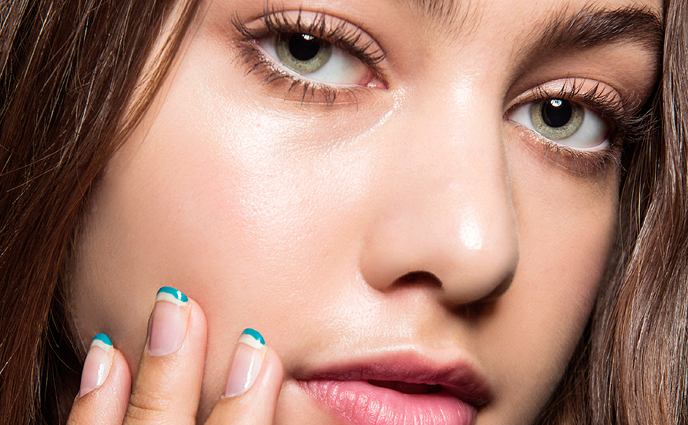Saying that birth control treats acne comes with a really, really important-to-note asterisk. Only some birth controls treat acne. Others, like those that mimic progesterone, may make it worse.
A study that Lortscher and Admani authored analyzed over 2,000 women on birth control, and found that a combination of estrogen and progesterone were most effective forms of birth control for acne. That includes brands like Yaz, Ocella and Ortho Tri-Cyclen. NuvaRing also reportedly improved acne, though not as much as the combination oral pills.
Curology has a handy interactive guide where you can type in your brand of birth control to see where it falls on the acne improvement scale.
A study that Lortscher and Admani authored analyzed over 2,000 women on birth control, and found that a combination of estrogen and progesterone were most effective forms of birth control for acne. That includes brands like Yaz, Ocella and Ortho Tri-Cyclen. NuvaRing also reportedly improved acne, though not as much as the combination oral pills.
Curology has a handy interactive guide where you can type in your brand of birth control to see where it falls on the acne improvement scale.
On the other side of things, IUDs like Mirena and Skyla made most women's acne worse, as did the Depo-Provera shot, which delivers hormones over a period of 12 weeks.
Of course, this also varied by case. While 36 percent of women surveyed said Mirena made their skin worse, 54 percent said it had no effect, and 10 percent said it helped a little bit or significantly.
If you have tricky skin, you may want to steer clear of long-release forms of birth control because those are progestin-only drugs and are more likely to cause acne, according to Admani. It's easy to quit a daily pill if your skin freaks out, but much harder (and potentially painful) to remove an IUD. The same goes for the depot injection. "Once you get the depot shot, it's in your body. You can't get rid of it," says Admani.
Of course, this also varied by case. While 36 percent of women surveyed said Mirena made their skin worse, 54 percent said it had no effect, and 10 percent said it helped a little bit or significantly.
If you have tricky skin, you may want to steer clear of long-release forms of birth control because those are progestin-only drugs and are more likely to cause acne, according to Admani. It's easy to quit a daily pill if your skin freaks out, but much harder (and potentially painful) to remove an IUD. The same goes for the depot injection. "Once you get the depot shot, it's in your body. You can't get rid of it," says Admani.
Sure, the pill sounds like it can be a magic wand for acne sufferers, but what happens when the time comes to get off of birth control?
The bad news: Your skin might break out when you come off the pill, especially if it was acne-prone before starting oral contraceptives. "Your skin is almost always going to be messed up when you change or go off of birth control," says Lortscher. Any time hormones fluctuate, that will likely show up on your skin. And you can't wean off of birth control like you can with other prescription medications, according to Admani, so it won't help to splice your pill or take it every other day.
The good news: You can have a plan of attack if you're going off the pill. Lortscher says one way to combat a post-pill flare up is taking a look at your diet. "Avoid high-glycemic foods (here's a list) and dairy," says Lortscher. Before you go off the pill, start a topical acne regimen to help the transition, Admani recommends. This can include products like a Retin-A cream, which will unclog your pores, and an antibacterial wash that contains benzoyl peroxide.
The bad news: Your skin might break out when you come off the pill, especially if it was acne-prone before starting oral contraceptives. "Your skin is almost always going to be messed up when you change or go off of birth control," says Lortscher. Any time hormones fluctuate, that will likely show up on your skin. And you can't wean off of birth control like you can with other prescription medications, according to Admani, so it won't help to splice your pill or take it every other day.
The good news: You can have a plan of attack if you're going off the pill. Lortscher says one way to combat a post-pill flare up is taking a look at your diet. "Avoid high-glycemic foods (here's a list) and dairy," says Lortscher. Before you go off the pill, start a topical acne regimen to help the transition, Admani recommends. This can include products like a Retin-A cream, which will unclog your pores, and an antibacterial wash that contains benzoyl peroxide.
If you're going off of birth control because you want to get pregnant, you won't be able to use some of the common topical prescription medicines, like topical retinoids. Admani recommends asking your dermatologist for azelaic acid or some types of laser treatments, which can be safe for pregnant women under the supervision of a doctor.
Whether you're going on the pill, off the pill or switching from one hormonal medication to another, both Admani and Lortscher agree that the general rule of thumb is to wait three months before jumping to conclusions. "It takes the body three cycles to adjust," says Admani. "Whatever side effect you're having, typically it gets better within three months."





